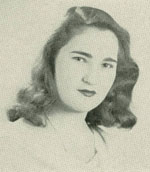During her almost 30 years at IBM, Starr held a number of management positions culminating in the position of Director of Product Management for Printers and Storage in Europe, Middle East, and Africa.
Member of Adelphi University’s Profiles in Success program.
Former Director of Product Management Printers and Storage IBM/Europe, the Middle East and Africa
Memorable professors: “Broadus Mitchell, Chair of the Economics Department. Dr. Arthur Moor, who taught Greek drama and Dr. Owen Groves, Chair of the English department.”
A family affair: “My sister Sylvia (Kurzon) Salzberg ’39 also attended Adelphi.”
 Jacqueline (Kurzon) Bellsey Starr ’45 has always been ambitions. At just 15 years old, ready to start college, she had dreams of going away for her studies. Because she was so young, her parents felt she should attend a school closer to their Brooklyn home. She chose Adelphi.
Jacqueline (Kurzon) Bellsey Starr ’45 has always been ambitions. At just 15 years old, ready to start college, she had dreams of going away for her studies. Because she was so young, her parents felt she should attend a school closer to their Brooklyn home. She chose Adelphi.
Starr remembered the events of World War II that happened during her Adelphi years well. “The day after Pearl Harbor there was an alert on campus,” she said. “An unidentified aircraft was over Mitchell Field and all the students were moved to the lower level of the R Building [now known as Woodruff Hall] until the aircraft was identified. Dr. Paul Dawson Eddy [Adelphi president] spoke to try to reassure the students.” She also recalled the less tumultuous times during the war, such as when Adelphi and the USO arranged for soldiers to come to Adelphi’s campus for dances.
Adelphi had many organizations for students to join and become active members of campus, and Starr took advantage of every opportunity to get involved. She was a member of the Gold Mask and named to the Daisy Chain her sophomore year. She served as the photo editor of the yearbook and wrote the gossip column for [what was Adelphi’s newspaper at that time] The Fortnightly and arranged senior portraits for the Class of 1945. A member of Phi Sigma Sigma, Starr loved her sorority years.
After graduating from Adelphi with her degree in economics, Starr decided she wanted to continue her education and go to law school—a path not many women were taking at that time. “Women rarely became lawyers. If anything, they became nurses, teachers or secretaries,” she said.
She applied to Columbia Law School “I didn’t expect to be accepted,” she said. But she was. In her class of 100 students at Columbia Law School there were just five women. “We were part of a class composed mostly of returning World War II soldiers, and everyone was there with a purpose,” she said. “We were serious about our studies.”
After completing part of her program, her husband’s work prompted a move out of New York. “I asked the dean if he would hold a spot for me. He begrudgingly agreed and then commented that although Columbia was a wonderful law school, in some ways Harvard was better. I asked him to explain, and he remarked that they didn’t take women. I remembered being affronted,” she said.
Starr stayed at home in the suburbs, raised three children and did not go back to law school. When her children were older—one each in college, high school and middle school—she decided she wanted to go to work. IBM, which had many facilities in Westchester, was close to their home. In 1966, she joined IBM as an analyst and ascended the ladder to manager of market research for the Data Processing Division, various other management positions and, subsequently, director of product management for printers and storage for the Europe, Middle East, Africa division.
“I worked at IBM at a time when the company was interested in diversifying,” said Starr, who in 1968, was one of six female employees chosen for a special program identified as Women as a Resource. “The mission of the program was to alert managers across the company to take advantage of the capabilities of women, and at the same time to provide female employees the same opportunities as men in obtaining jobs and promotions within the company.”
Starr said that her experience as a woman at IBM at this time was more than positive. Being a woman in a male oriented culture provided many opportunities. When meeting with a group of colleagues, she was frequently the only female. “When I arrived at those meetings, and everyone understood that I was not there to take notes or get coffee—the traditional secretarial chores—the conduct of business proceeded and my opinions were duly noted,” she said.
During her almost 30 years at IBM, Starr held a number of management positions culminating in the position of Director of Product Management for Printers and Storage IBM/Europe, the Middle East and Africa.
Starr talked about how her life was shaped by her career. “The challenges and gratification of my work were rewarding and sustaining,” she said. “I met and worked with people from all walks of life and many countries that I never would have known. I made friendships that still survive, and it saw me through some difficult personal times. I consider myself most fortunate.”
Today she volunteers her time at Mount Sinai Hospital. As a member of a Patient Preference Committee, she helps improve non-medical experience for patients’ families and friends. In her free time, she plays bridge and she and her husband enjoy lectures at The New York Historical Society, frequent Broadway performances, make visits to New York museums and events at SUNY Purchase, especially performances of the Westchester Philharmonic Society.
Published December 2014
For further information, please contact:
Todd Wilson
Strategic Communications Director
p – 516.237.8634
e – twilson@adelphi.edu